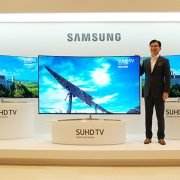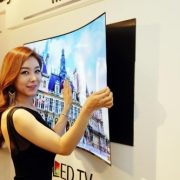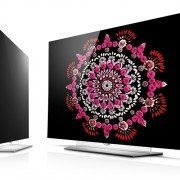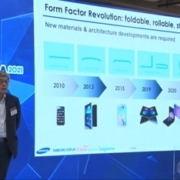Why is ‘Cadmium-free’ Significant? Samsung’s Quantum Dot SUHD TV
Hyunjoo Kang / jjoo@olednet.com
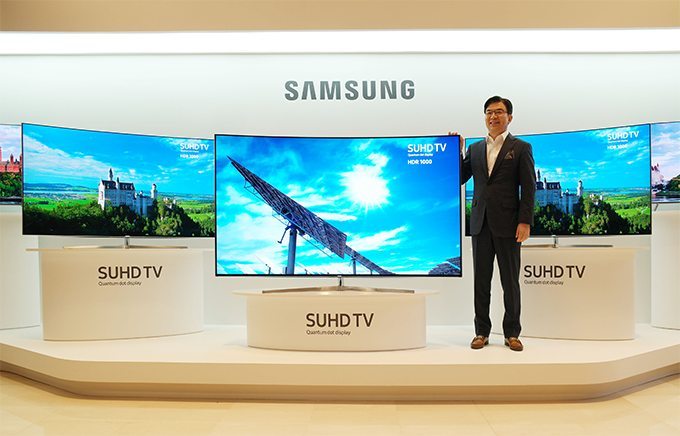
<Samsung Elec. Released 2nd Generation Quantum Dot TV. Source: Samsung Elec.>
On the subject of Samsung Electronics’ 2nd generation quantum dot display equipped SUHD TV product, recently released in Korea, display experts consider the actualization of 1,000 nit without cadmium as the key strength.
In 2015, Samsung Elec. first launched quantum dot SUHD TV under the name nanocrystal technology. Each quantum dot of nanosize, 10,000 times narrower than a human hair, actualizes accurate color.
According to Samsung Elec., the 2nd generation quantum dot technology to produce this new product, an improvement over last year’s. The company emphasized that compared to the previous product, the price was reduced and brightness was improved. HDR (high dynamic range) with 1,000 nit maximum was applied to the new product.
The 1,000 nit brightness is the standard figure of premium image produced in Hollywood, US. If this figure is high, screen’s bright and dark areas can be experienced fully even in bright environment such as a living room area.
Although not applied to all models of Samsung’s 1st generation quantum dot SUHD TV, 1,000 nit brightness was applied to the majority of the models; that 1,000 nit brightness was applied to the new product is not worth much attention by itself.
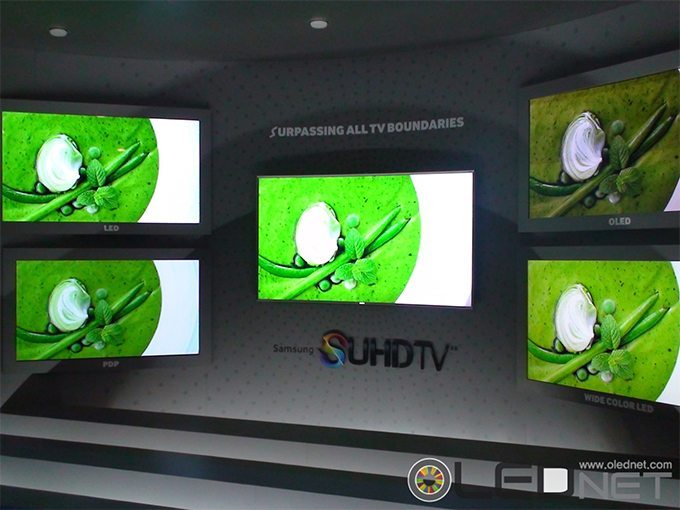
<Samsung Elec.’s 1st Generation Quantum Dot TV vs. Other Display in CES 2015>
◆Hazardous Heavy Metal Cadmium, Why Difficult to Remove?
Quantum dot film includes cadmium. As cadmium is a hazardous heavy metal, cadmium including quantum dot film cannot be environmentally friendly. Cadmium use in Europe is limited.
However, without cadmium, the quantum dot film’s optical efficiency is reduced. In order to make up for this, LED chips have to be applied which increases the price as well as the energy consumption. An alternative method to avoid this is development of additional quantum dot materials that increase efficiency.
For these reasons, some Chinese companies that produce quantum dot display equipped products select to use cadmium, overlooking the environmental issues. Samsung Elec. also emphasized that it is the only company that utilizes environmentally friendly cadmium-free quantum dot materials.
Through quantum dot materials’ efficiency and color mapping algorithm improvement, Samsung actualized 1,000 nit brightness without resorting to cadmium and without increase in power consumption. Color accuracy, which is a quantum dot display trait, was also improved by 25%.
Samsung Elec. is planning to release 14 models of SUHD TV, from 49 inch to 88 inch, in Korea. This is over 30% increase compared to last year. The price also was reduced by 900,000 KRW compared to the previous version. The new products, depending on the specifications, cost around 6 million KRW for 65 inch, and 4 million KRW for 55 inch.
A comment from a display expert is, “the new product has 1,000 nit brightness is not significant by itself, and color accuracy improvement also is not of much attention as it is an existing quantum dot trait”. However, he also put another comment from his analysis, “1,000 nit brightness was actualized without using cadmium and without decreasing energy efficiency is worth noting”.

